
From the beginning, revered saints have had a deep love for books, each Sufi master imparting immense blessings upon the people of their time. Through their teachings, thousands embraced Islam, while those already Muslim but struggling to tread the right path were guided to the straight way of Allah. Even the virtuous were reminded that mere acts of worship were not the ultimate purpose of life, but rather, they were encouraged to seek the truth of their connection with the Creator. Each individual was blessed according to their capacity with a portion of divine knowledge.
One day, Wāṣif Sahib sat quietly as the sun began to set, casting the world in shadows. There was an aura of peace and majesty around him. Breaking the silence, he said:
“Many great saints have passed in every era, each with their own grace. Some became known for their shrines, while others—though perhaps greater in sainthood—did not. Then, there are saints who were authors. It is rare in history to find a saint who is both an author and has a shrine. This is a unique phenomenon.“
As time passed, the meaning of his words became clearer. When his first book, Kiran Kiran Sooraj, was published, it marked the beginning of a prolific writing journey that would continue unabated. His writings, columns, and interviews gained attention in newspapers and various media, cementing his position as an influential author.
Books became a way for him to extend his guidance to all those who came into contact with him. He would often gift his books to visitors, and even mail them to those who wrote to him. When someone suggested placing a price on the books, he replied:
“This is the langar of the faqir; langar has no price.“
Recognizing the importance of books in transmitting the Sufi wisdom, he once remarked on seeing the widespread circulation of his works:
“Many before us have written, but few saw their books published in their lifetime. We are under Allah’s mercy that so many of our books have been published.“
He once shared:
“Only a few of our books have been published so far, but we have over forty-six more yet to come.“
Wāṣif ʿAlī Wāṣif’s writings cover a vast range of spiritual insights, making his legacy a treasured inheritance for those who seek truth. His intellectual and spiritual contributions are preserved in a comprehensive body of work that reflects the wisdom of Sufi tradition, ethical teachings, and an unwavering connection to Islam. His unique style, referred to as “Wāṣifiyaat,” offers timeless wisdom, touching the hearts of readers across generations.

MAJOR LITERARY WORKS
MAJOR LITERARY WORKS
ESSAYS AND COLUMNS
- Kiran Kiran Sooraj (1986)
This foundational work explores themes of spirituality and divine enlightenment, setting the tone for Wāṣif Sahib’s aphoristic style of writing. - Dil Darya Samundar (1987)
A poetic reflection on how the heart seeks to merge with divine love, written in an elegant and deeply philosophical style. - Qatra Qatra Qulzam (1989)
Through a drop-by-drop metaphor, Wāṣif Sahib conveys the journey of the soul towards self-realization and a deep connection with Allah. - Harf Harf Haqeeqat (1994)
Published posthumously, this collection of writings presents profound insights into the eternal truths of existence, where every word conveys layers of spiritual depth.
POETRY
- Bharay Bharolay (Punjabi Poetry)
Expressing mystic thoughts through Punjabi verses, this collection beautifully captures the soul of Sufi tradition and Wāṣif’s love for God. - Shab Chiragh (1978)
A poignant collection of Urdu poetry by Wāṣif ʿAlī Wāṣif that explores themes of love, longing, and the spiritual journey. Through evocative imagery and lyrical expression, the poems illuminate the beauty and complexities of human emotions, reflecting the author’s deep connection to both the divine and the world around him. - Shab-e-Raz (1995)
A masterful collection of Urdu poetry that delves into the mysteries of existence, love, and the Divine. - Ziker-e-Habeeb; Na’tia Poetry (2004)
A masterful collection of Urdu poetry that delves into the mysteries of existence, love, and the Divine.A heartfelt collection of poetic expressions dedicated to the love and reverence for the Prophet Muhammad (ṣallā -llāhu ʿalayhī wa-ʾālihī wa-sallam). Through vivid imagery and profound emotions, Wāṣif ʿAlī Wāṣif beautifully captures the essence of devotion and the spiritual connection to the beloved Messenger, making it a cherished work among Sufi poetry enthusiasts.Ziker-e-Habeeb; Na’tia Poetry (2004)
A masterful collection of Urdu poetry that delves into the mysteries of existence, love, and the Divine.
Collections of Sayings and Conversations
- Ba’t Se Baat (1995)
A compilation of some of Wāṣif Sahib’s most insightful sayings on topics ranging from spirituality to daily life. - Guftugu (1996)
This series contains the questions and answers from his gatherings, where seekers of truth posed their queries, and Wāṣif Sahib responded with clarity and wisdom. - Dareechay; Aphorism (2004)
A thought-provoking collection of aphorisms by Wāṣif ʿAlī Wāṣif that encapsulates his profound insights on life, spirituality, and human relationships. Each aphorism serves as a window into his unique perspective, inviting readers to reflect deeply on their own experiences and the essence of existence.
Wāṣifiyaat: A New Thought System
Wāṣif ʿAlī Wāṣif’s unique style of writing, often referred to as Wāṣifiyaat, represents a significant contribution to modern Urdu literature. His writings masterfully blend mysticism, ethics, and patriotism, all deeply rooted in Islamic teachings. What distinguishes Wāṣif Sahib from his contemporaries is his ability to address the complexities of modern societal challenges through the timeless wisdom of the Sufi tradition. Many of his aphorisms and quotes have gained proverbial status, making him one of the most quoted contemporary Urdu writers. His ability to speak to both the intellect and the soul has garnered a vast and diverse readership.
Rooted in the Shariah, his teachings emphasize the inner essence of Islam—its spirituality, and the moral values that shape personal and social life. His works resonate not only with intellectuals and spiritual seekers but also with everyday readers, ensuring his enduring relevance across a wide audience.
A Lasting Influence
A LASTING INFLUENCE
Wāṣif ʿAlī Wāṣif’s books, sayings, and poetry continue to inspire readers long after his passing. His works are frequently cited in discussions on Sufism, literature, and philosophy. With a deep focus on the spiritual and moral development of individuals and society as a whole, his teachings have left an indelible mark. Today, his influence persists through his published works, the wisdom he imparted to his followers, and the countless lives he touched.
Seminars and Public Programs (1993 – Present)
Since 1993, numerous seminars have been held to honor the life and works of Wāṣif ʿAlī Wāṣif. These gatherings draw scholars, spiritual seekers, and admirers who engage in discussions about his teachings. Such events continue regularly in various cities, featuring recitations of his poetry and prose, and playback of his recorded dialogues. These recordings, cherished by audiences, offer spiritual insight and moments of reflection.
Musical Presentations of Wāṣif ʿAlī Wāṣif’s Poetry
Wāṣif Sahib’s poetry has been interpreted and brought to life by renowned musicians and vocalists, further deepening the emotional and spiritual resonance of his verses. Some of the most prominent artists who have performed Wāṣif ʿAlī Wāṣif’s poetry include Khan Sahib Mehdi Hassan, Ustad Nusrat Fateh Ali Khan, Hamid Ali Khan, Ustad Badar Miandad, Iqbal Baho, Muhammad Saleem, and Dr. Tariq Jamal. These performances, alongside those of many other artists, have introduced Wāṣif Sahib’s spiritual message to new audiences, ensuring its continued relevance.
Published Books on Wāṣif ʿAlī Wāṣif’s Life and Work
Several books have been published that compile reflections on his life, teachings, and writings:
Wāṣif Basafa (1994) – A compilation of writings and articles from various scholars and admirers of Wāṣif ʿAlī Wāṣif.
Qutb Irshad: Sayyidna Wāṣif ʿAlī Wāṣif (1998) – Written by Chaudhry Riaz Ahmed, this book explores Wāṣif Sahib’s spiritual role and contributions, offering a detailed account of his teachings and legacy.
Academic Studies on Wāṣif ʿAlī Wāṣif
The intellectual and spiritual impact of Wāṣif ʿAlī Wāṣif is reflected in the academic research conducted at major universities:
M.Phil Dissertation – Zaheer Badr
In his M.Phil thesis, Wāṣif ʿAlī Wāṣif – Aḥwāl o Asār, Zaheer Badr spent several years interviewing individuals and traveling extensively to compile a comprehensive study of Wāṣif Sahib’s life and teachings. His work is regarded as a major contribution to the understanding of Wāṣif Sahib’s spiritual and literary influence.
M.A. Dissertation – Sarwat Tariq
A student at Punjab University, Sarwat Tariq conducted extensive research on Wāṣif Sahib’s personality and literary work. Her thesis, titled Wāṣif ʿAlī Wāṣif – Shakhsiyat aur Fun (Wāṣif ʿAlī Wāṣif – Personality and Art), earned her a Master’s degree. This thorough collection, complete with references, provides valuable insights into his life and contributions.
Wāṣif Basafa (1994) – A compilation of writings and articles from various scholars and admirers of Wāṣif ʿAlī Wāṣif.
Qutb Irshad: Sayyidna Wāṣif ʿAlī Wāṣif (1998) – Written by Chaudhry Riaz Ahmed, this book explores Wāṣif Sahib’s spiritual role and contributions, offering a detailed account of his teachings and legacy.
Wāṣif ʿAlī Wāṣif’s Enduring Message
The spiritual and intellectual contributions of Wāṣif ʿAlī Wāṣif continue to inspire new generations, both in Pakistan and internationally. His work remains a testament to the eternal connection between his message and the Divine. His famous words encapsulate his mission:
“I am a person; through me, nations emerge. I am a dream that gives birth to realities.”
Through his books, seminars, musical tributes, and academic research, Wāṣif ʿAlī Wāṣif’s message continues to flourish. His work, grounded in a profound love for the Divine, remains destined to inspire countless individuals and stands as a bridge to spiritual awakening in future generations.
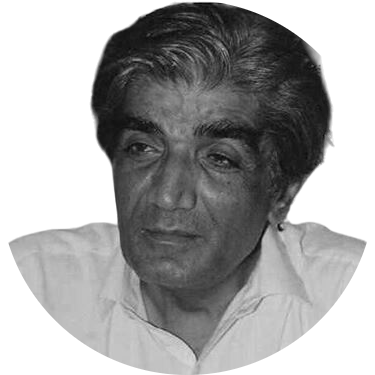
Translated Works: The Spiritual Legacy of Waṣif ʿAlī Waṣif
The Beaming Soul: Kiran Kiran Suraj
Publication Year: June 19, 2025
Translated by: Wasif Ali Wasif
Edited by: Ghaith Irshaidat & Hafsa Tahir
Brief Description:
“The Beaming Soul: Kiran Kiran Suraj” is a profound collection of aphorisms that explores the inner turmoil and disillusionment of modern humanity. In an age where attempts to secure personal safety have paradoxically resulted in greater insecurity, this book delves into the crises of self-identity and the disarray of human thought. Wasif Ali Wasif masterfully articulates the existential struggles faced by individuals in a world where knowledge is abundant but inner peace remains elusive.
The book touches upon the collapse of virtues, the increase in selfish desires, and the growing sense of isolation among mankind. Wasif Sahib poignantly portrays a civilization that, despite its material comforts, suffers from spiritual desolation. He invites readers to look beyond worldly achievements and rediscover the essential purpose of life, cautioning against the pitfalls of a superficial existence. “The Beaming Soul” serves as a reminder that despite the chaos of modernity, hope and self-awareness can lead individuals towards spiritual fulfillment and inner peace.
Key Highlights or Features:
“Your natural companion, your real identity, is the man within you, He it is who worships Allah or revolts against Him. He it is who goes for this world or aspires for the next. Your inner self is to make you worthy of reward or deserving of punishment. The decision lies with you. Your hidden self is your best friend as well as your worst enemy. ”
This reflection emphasizes the power of self-awareness and inner transformation, urging readers to focus on their internal journey toward spiritual well-being.
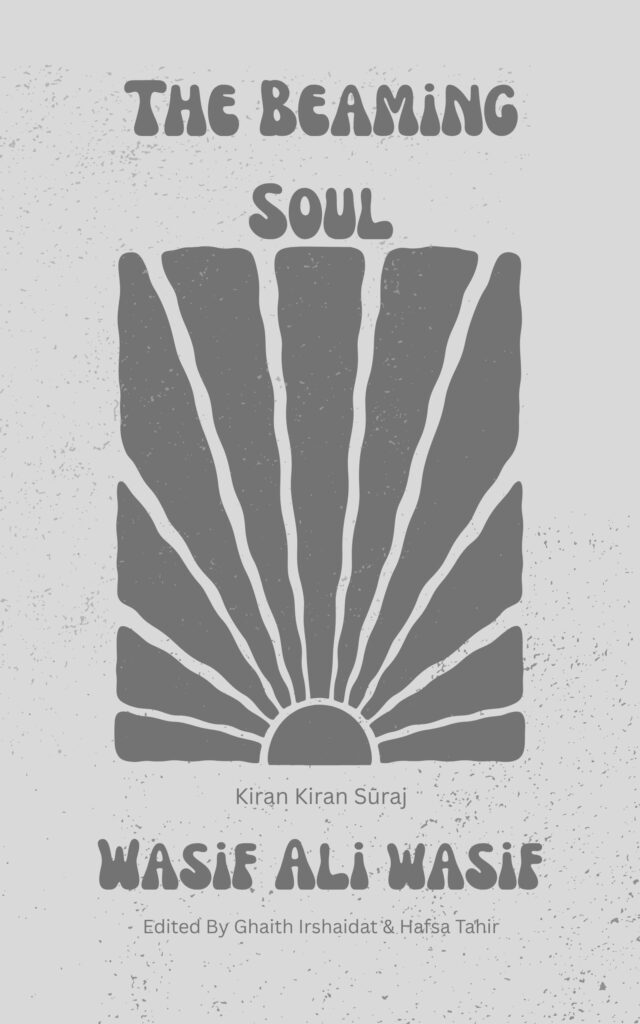
Ocean in a Drop: Qatra Qatra Qulzum

Publication Year: June 17, 2025
Translated by: Wasif Ali Wasif
Compiled & Presented by: Ghaith Irshaidat & Hafsa Tahir
Brief Description:
“Ocean in a Drop: Qatra Qatra Qulzum” is a profound collection of aphorisms and essays by Wasif Ali Wasif, now translated into English to reach a broader audience. Originally written in Urdu, this work was in high demand after the successful translation of his previous works. Wasif Sahib, with the assistance of Dr. Saleem-ur-Rahman, undertook the translation of this remarkable book, ensuring that its wisdom could resonate with readers worldwide. This book addresses a wide range of human experiences, providing solace to aching hearts and guiding burning souls towards enlightenment. Wasif Sahib’s unique insight into life’s complexities is brilliantly captured, offering both spiritual reflection and practical guidance. Readers can immerse themselves in the vast expanse of topics that reflect Wasif’s bright and broad perspective. “Ocean in a Drop” is a work of immense depth that promises to ease and inspire its readers, becoming a source of comfort and peace for those in search of higher truths.
Key Highlights or Features:
“Life itself is only life. It is someone’s bestowal _______ Someone’s benevolence _______ An act of someone else. It is like an ocean _______ vast and boundless _______which only has one side _______ one shore _______ having hustle & bustle, gatherings, illuminations & large crowd _______ It also have loneliness and sadness. No one knows about the other end of this ocean. Those who went to explore the other end are not back yet. This side is full of colors, a wide spectrum _______and the other side is colorless _______having only one color. Who knows what is there in this ocean and what is beyond it. Here there is a large crowd but afterwards everyone will be alone. “
This passage encapsulates the essence of Wasif Sahib’s wisdom, revealing the profound impact of simplicity, thoughtfulness, and inner enlightenment on one’s life and surroundings.
Doors To The Insight: Dareechay
Publication Year: September 23, 2022
Translated by: Ghaith Irshaidat & Hafsa Tahir
Brief Description:
“Doors To The Insight: Dareechay” is a profound collection of Wāṣif Ali Wāṣif’s most impactful quotes, offering deep reflections in short, digestible aphorisms. Each thought serves as a beacon of spiritual and practical wisdom, guiding readers toward personal growth and spiritual enlightenment. Whether you’re seeking guidance on inner peace, understanding of the Divine, or simply looking for daily wisdom, this book will invite you to contemplate life’s deeper truths and inspire transformation. With timeless insights presented in easily comprehensible language, it is perfect for those with busy lives who still seek moments of meaningful reflection.
Key Highlights or Features:
“The pursuit of happiness, the attainment of happiness, the obsession with happiness, and the longing for happiness alone are the beginnings of restlessness.”
“A single negative word can overshadow the memory of a lifetime of good deeds.”
“If you don’t let your desires become stubborn obsessions, you will find inner peace.”
“When a person enters the realm of the Divine, they are introduced to the stage of Light, which holds a higher status than both the spirit and the soul.”
“The only way to escape from the confines of this world is to detach yourself from it. By dying to this world, you transcend to the realm of primordial existence, where you are connected to the eternal and become immortal.”
“Do not misrepresent someone else’s fate unless you are certain of your own outcome.”
”Love requires being unconcerned with the actions of others and continuing to love.”
”Seek knowledge that can rectify some of your actions.”
These are just a few of the many gems within this collection, each offering a path toward self-discovery and understanding of the Divine.
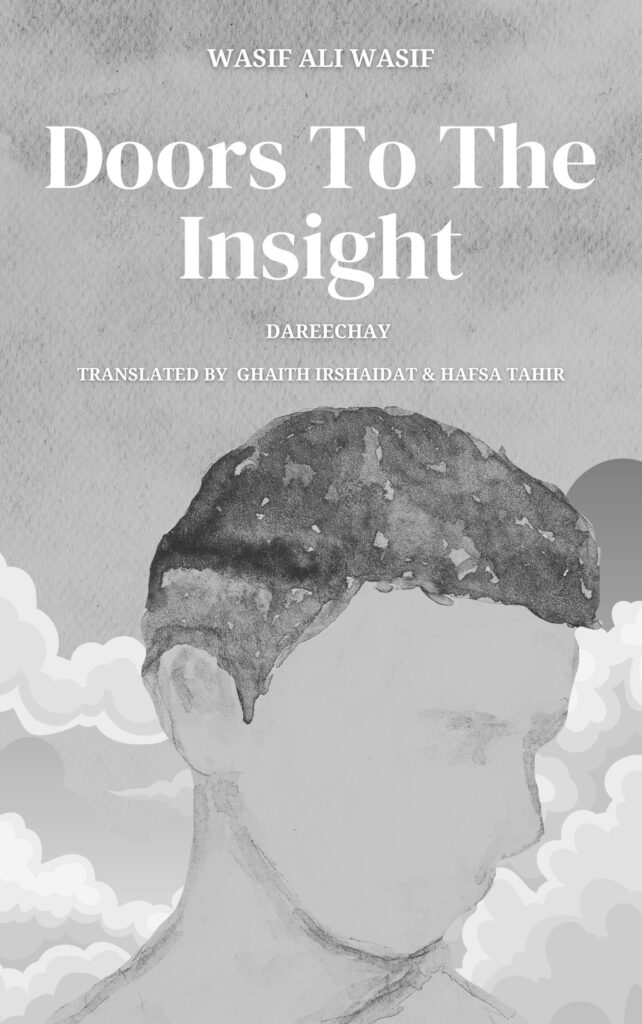
The Truth Unveiled: Harf Harf Haqeeqat
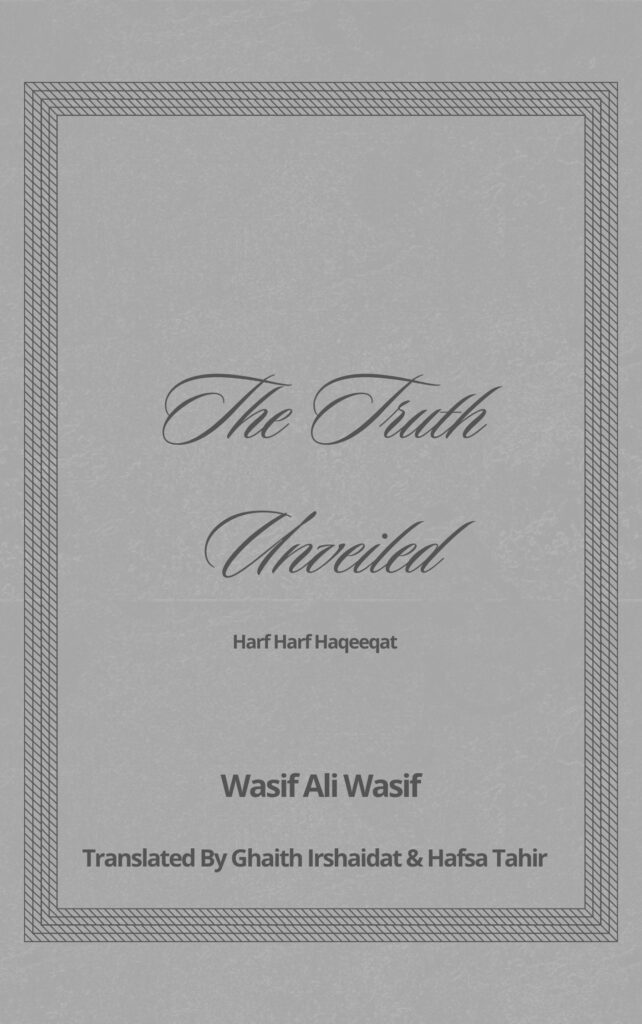
Publication Year: July 12, 2023
Translated by: Ghaith Irshaidat & Hafsa Tahir
Brief Description:
“The Truth Unveiled: Harf Harf Haqeeqat” invites readers on a profound journey through 37 thought-provoking chapters that delve deep into the essence of human existence. This book skillfully dissects the complexities of our perceptions, beliefs, and desires, exposing the unseen layers that shape our understanding of life. Through narratives that challenge societal norms and personal assumptions, the author provides keen insights into topics such as identity, compassion, arrogance, and the quest for purpose. Each chapter calls for introspection, urging the reader to reflect on the consequences of self-centeredness and to seek a higher path of empathy, humility, and spiritual growth. With its blend of sharp observation and timeless wisdom, “The Truth Unveiled” serves as a reminder that true enlightenment lies not in serving the self but in embracing compassion and the pursuit of deeper truths.
Key Highlights or Features:
From Chapter 22, The Reason to Exist
“Life does not owe you its justification; rather, you have given life the justification to exist. If no one notices you, love a plant. Nurture it, protect it from storms, protect it from wild creatures and birds, shield it from harsh sunlight, and safeguard it from excessive rainfall. Raise it, let butterflies perch on it. Even if someone else enjoys its fruits, it shouldn’t be a cause for concern. Your efforts will never go in vain. You will be granted the justification and reward for staying alive. If nothing else can be done, polish a stone, nurture it, work hard on it, and it will become a mirror of stone. Inside the mirror, the justification of life will be inscribed.”
This passage, like many others in the book, encourages readers to find meaning in life through selfless acts of care and dedication, offering profound insights into the pursuit of true contentment.
Anonymous Writer: Gumnaam Adeeb
Letters to Wāṣif Ali Wāṣif
Publication Year: August 10, 2023
Translated by: Ghaith Irshaidat & Hafsa Tahir
Brief Description:
“Anonymous Writer: Gumnaam Adeeb” is a poignant collection of letters written to the revered spiritual and literary figure, Wāṣif Ali Wāṣif. This book provides an intimate look into the heart of a man whose wisdom touched countless lives. As Wāṣif Sahib’s reputation grew, so did the number of individuals who reached out to him, seeking his guidance and solace through written correspondences. This collection spans a range of themes—personal struggles, societal issues, religious inquiries, and universal questions about life—highlighting the deep connection between Wāṣif Sahib and his readers. The letters reveal a remarkable dialogue: on one side, the vulnerability of people searching for answers, and on the other, Wāṣif Sahib’s profound responses, shaped by his vast spiritual insight and understanding of human nature. Divided into two parts, this book presents both the original letters and Wāṣif Sahib’s replies, providing a rich glimpse into his writing style, wisdom, and the compassion he showed to everyone who sought his light. “Letters to Wāṣif Ali Wāṣif” is a spiritual and literary masterpiece, preserving a legacy of profound human connection and guidance.
Key Highlights or Features:
“The lamp of your memory keeps burning… Be content and observe; good times are worth waiting for. The success of small objectives is achieved in a short time. Great successes come after a long time. You are a doctor; you understand that vegetables cook quickly, but diamonds and jewels are formed after centuries.”
“What’s the use of complaining about others? If you can do something, then do it. You cannot convert someone else’s flaw into your virtue. If you are looking for a flaw, search within yourself. If you are looking for a virtue, look in others. Always seeing flaws in others is a claim of being perfect, and this claim is false.”
This passage encapsulates the timeless wisdom Wāṣif Sahib imparted to his readers, offering hope, patience, and spiritual insight.

THE LEGACY OF LETTERS
The Legacy of Letters: Heartfelt Dialogues with
Waṣif ʿAlī Waṣif
When we look at the history of mankind, letters have been a medium for conveying personal messages, spreading teachings, and even sparking revolutions. Here, the aim is to present a brief review of the letters written to our revered mentor, Qibla Waṣif Ṣāḥib. During his blessed lifetime, he began organizing letters into files. Among these, there were many old letters. However, when he started writing columns for Nawā-i-Waqt, a large number of people began writing letters to him. Sometimes, people would mention in their letters, “You haven’t replied to our previous letters, yet we are writing again.” This was largely due to issues with the postal system.
To resolve this, he went to the post office and rented a P.O. Box, numbered 4092. Now, he regularly checked the mail. If he was traveling, upon returning, he would ensure to check the P.O. Box, and if he wasn’t traveling, he would send someone to collect the mail so that no one had to wait long for a reply, and their concerns could be addressed promptly. The P.O. Box number was listed at the end of each column, and soon, letters started pouring in. Letters containing only praise did not necessarily require a response, but even those were often replied to. Initially, he would write the replies himself, but as the volume of letters increased, correspondence from across the world started coming in.
At this point, he began dictating replies on his personalized letterhead, which were then signed by him. The most replies were written by respected Ikrām Chughtāʾī Ṣāḥib. Many letters came in English, and their replies were also written in English. Once, someone sent a poetic letter, to which he replied in verse. The letters ranged from personal matters to profound literary and intellectual inquiries, and each person was responded to according to their understanding and capacity.
Soon, he realized that these letters and their replies were of great importance. He instructed that each incoming letter and its response be photocopied, dated, and numbered. One day, he remarked that if all these letters, along with those still held by others, were collected, they would form a book. Many of these letters were literary or spiritual masterpieces, and he recognized the potential of the writers instantly, encouraging them by saying, “You should continue writing.” He referred to such individuals as “anonymous writers.” His replies were not only masterpieces in their own right but also demonstrated something unique: while addressing a large audience in his columns or talks, he would consider the collective intellectual capacity of the people and speak in a manner that was easily understood by all. This was a significant aspect of his communication.
When it came to letters, however, the tone was different. Here, he was addressing an individual, directly solving their particular issue. This was a form of direct communication, a “Heart to Heart Talk.” There are several ways to transfer the light of knowledge and wisdom from one heart to another: through direct meetings, focused attention even without meeting, and through such letters. In the letters, he was addressing an individual, a unit, shaping them as a person.
In the spiritual realm, every person has a single core issue that neither they nor anyone else understands. However, the enlightened beings, through the divine light granted by Allāh, grasp this issue and, in a moment, resolve it with a few words or sentences. The letters of Qibla Waṣif Ṣāḥib, if analyzed with close attention, show that he addressed only the afflictions of the addressees, never wasting a word. His concise writing, a trait in itself, reflects the teachings of the beloved Prophet (ṣallā -llāhu ʿalayhī wa-ʾālihī wa-sallam), whose advice was always succinct and meaningful.
His letters were solutions to complex problems, elegantly resolving them with brevity. Each letter and its response are not just a new experience for the reader but a journey into a world of wisdom. These writings are a treasure trove for both the spiritual and literary worlds, with a unique characteristic that Qibla Waṣif Ṣāḥib once pointed out: “Preserve the letters and their replies. The question asked in a letter is often one that resides in the minds of many others. When another person reads the reply, their problem will also be resolved.”
In terms of literature, this correspondence stands out as a unique contribution. The letters and the accompanying responses form a distinctive and valuable addition to the genre of letter writing. The language used is simple yet dignified, ensuring that people of all levels of intellect can grasp the message. When we examine the content, several themes emerge clearly: the omnipresence of Allāh, faith in the Prophet (ṣallā -llāhu ʿalayhī wa-ʾālihī wa-sallam) as the center of the Ummah, love for his persona, respect for the saints who spread and propagated the faith, and a deep love for the homeland. Moreover, there is one particularly powerful and unique message: guiding the recipient out of confusion and into the world of certainty. He urged them to choose a clear path and to live with focus and conviction, offering practical solutions to help them adopt this approach.
When viewed from this angle, the multifaceted and far-reaching benefits of these letters become even more apparent.
Segue of Spiritual Whispers: Baat Se Baat
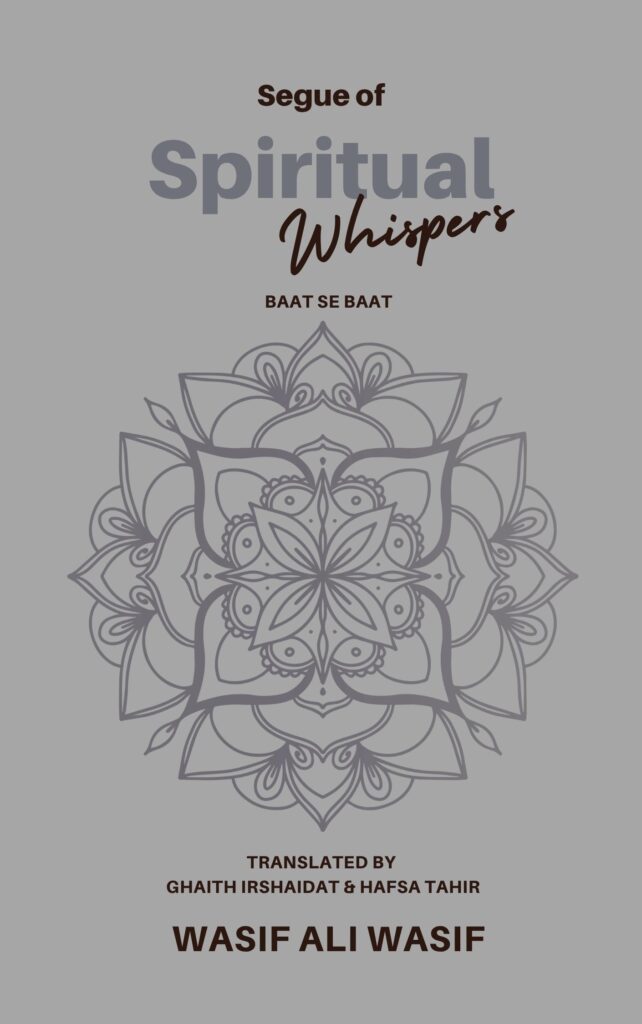
Publication Year: August 25, 2023
Translated by: Ghaith Irshaidat & Hafsa Tahir
Brief Description:
Segue of Spiritual Whispers (Baat Se Baat) invites readers to embark on a transformative journey into the realm of wisdom and spiritual enlightenment, as envisioned by the celebrated thinker Wāṣif Ali Wāṣif. This collection of thought-provoking quotes, expertly translated by Hafsa Tahir, encourages deep contemplation on the mysteries of existence and the essence of spiritual growth. With insights that transcend cultural and geographical boundaries, these whispers of wisdom guide readers toward a life enriched with compassion, empathy, and profound understanding. This book is not merely a reading experience; it serves as a pathway to inner transformation and enlightenment.
Key Highlights or Features:
“Wealth doesn’t create respect; it creates fear.”
“The passion of a singer enlivens the hearts.”
“The process of tempting the nafs (ego) begins with the eyes, and then a person, like an animal, becomes obsessed in the pursuit of its prey.”
“Honesty should be introduced to the majority; it fosters truthfulness and fearlessness… If this stage is reached, what’s better than democracy?”
“The outward appearance doesn’t necessarily reflect the inner reality.”
“One who abandons thoughts of the Creator and is lost in thoughts of creation remains in loss in both religion and the world.”
“Among the great people of the world, only a few qualities are admired. The only truly great being is Prophet Muhammad ṣallā -llāhu ʿalayhī wa-ʾālihī wa-sallam, whose life is exemplary in every aspect…”
These highlights capture the essence of Wāṣif Sahib’s teachings, promoting a deeper understanding of self and spirituality.
Publication Year: October 4, 2023 – September 21, 2024
Translated by: Ghaith Irshaidat & Hafsa Tahir
Brief Description: Series Overview
The Spiritual Dialogues: Guftugu Series is a monumental collection of 50 books, capturing the Q&A sessions with Sufi Master Wāṣif Ali Wāṣif. Each volume preserves the essence of his wisdom, covering a wide range of topics from spirituality and faith to everyday life challenges. Wāṣif Ali Wāṣif’s unique ability to convey profound insights through concise yet impactful statements is at the heart of this collection. This series is a testament to his deep understanding of human nature and his timeless guidance for those seeking a higher purpose in life. These books are an unparalleled contribution to Urdu literature, encapsulating the intellectual gatherings where Wāṣif Sahib shared his knowledge, answered questions, and guided seekers on their spiritual journeys. With each book, readers are invited into a space of reflection, where the ordinary becomes extraordinary through the lens of spiritual wisdom.
Key Highlights:
Heartfelt Guidance
“To find tranquility of the heart, do not destroy anyone else’s peace. Keep others happy, and you will find peace. Do not love money excessively, and you will find peace. If Allah accepts your prayer, say ‘Subhan Allah.’ But even if He disapproves, accept it with the same grace—this too is His decree. Respect the rejected wish as much as the accepted one.”
Spiritual Integrity
“The one engaged in work should create with honesty. Guard your own life; that too is worship. Serving others is worship. Protecting the possessions of orphans is worship. Honoring your parents is worship. Fulfill your commitments, for Islam calls Prophet Muhammad (ṣallallāhu ʿalayhī wa-ʾālihī wa-sallam) ‘Sadiq-ul-Wa’d,’ the Truthful in Promise. Hold fast to truthfulness, for without it, religion is hollow.”
On Righteous Companionship:
“If you find someone who loves you, their love will guide you across the river of life. Choose righteous companions, visit righteous gatherings, and fill your heart with righteous thoughts. Avoid bad company, harmful books, and negative conversations. Strive for purity in everything you do.”
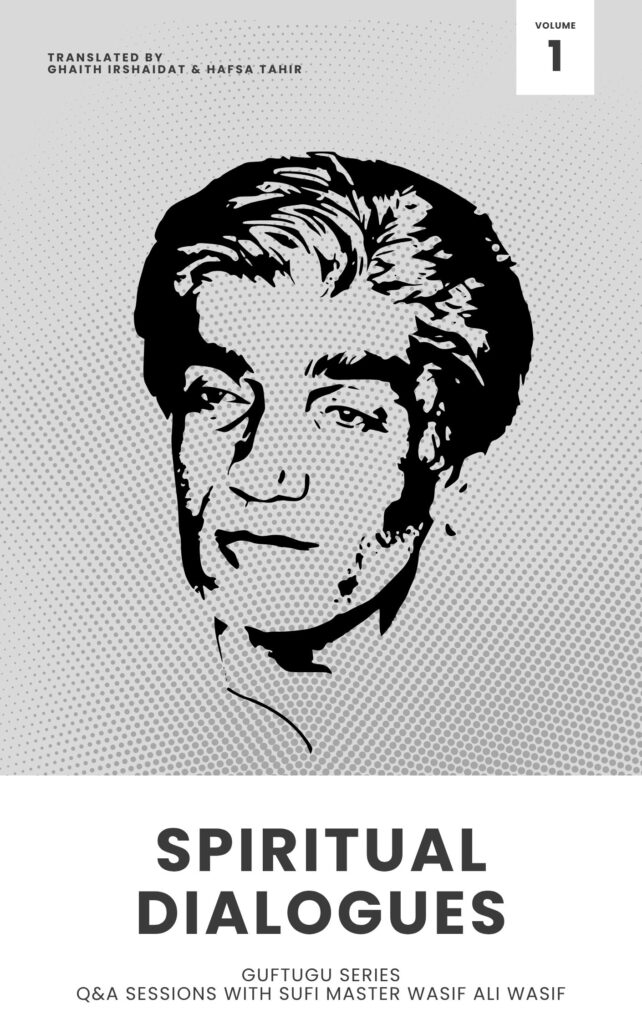
Spiritual Dialogues: Guftugu Series
AVAILABLE BOOKS IN SPIRITUAL DIALOUGES SERIES
- Spiritual Dialogues: Guftugu 1
- Spiritual Dialogues: Guftugu 2
- Spiritual Dialogues: Guftugu 3
- Spiritual Dialogues: Guftugu 4
- Spiritual Dialogues: Guftugu 5
- Spiritual Dialogues: Guftugu 6
- Spiritual Dialogues: Guftugu 7
- Spiritual Dialogues: Guftugu 8
- Spiritual Dialogues: Guftugu 9
- Spiritual Dialogues: Guftugu 10
- Spiritual Dialogues: Guftugu 11
- Spiritual Dialogues: Guftugu 12
- Spiritual Dialogues: Guftugu 13
- Spiritual Dialogues: Guftugu 14
- Spiritual Dialogues: Guftugu 15
- Spiritual Dialogues: Guftugu 16
- Spiritual Dialogues: Guftugu 17
- Spiritual Dialogues: Guftugu 18
- Spiritual Dialogues: Guftugu 19
- Spiritual Dialogues: Guftugu 20
- Spiritual Dialogues: Guftugu 21
- Spiritual Dialogues: Guftugu 22
- Spiritual Dialogues: Guftugu 23
- Spiritual Dialogues: Guftugu 24
- Spiritual Dialogues: Guftugu 25
- Spiritual Dialogues: Guftugu 26
- Spiritual Dialogues: Guftugu 27
- Spiritual Dialogues: Guftugu 28
- Spiritual Dialogues: Guftugu 29
- Spiritual Dialogues: Guftugu 30
- Spiritual Dialogues: Guftugu 31
- Spiritual Dialogues: Guftugu 32
- Spiritual Dialogues: Guftugu 33
- Spiritual Dialogues: Guftugu 34
- Spiritual Dialogues: Guftugu 35
- Spiritual Dialogues: Guftugu 36
- Spiritual Dialogues: Guftugu 37
QUESTIONS AND ANSWERS WITH WASIF ALI WASIF
The Illuminated Path: Questions and Answers with Wāṣif Ali Wāṣif
Human beings are the beautiful embodiment of both body and soul. When Allāh created humans from clay, He breathed a soul into them. The body is composed of the four elements: earth, fire, air, and water, while the soul’s connection is to the higher realms. In every human being, the soul remains engaged in its actions. It rejoices at the sight of beauty, is captivated by pleasant fragrances, and is perfumed with the fragrance of beautiful thoughts. Upon hearing a kind word, a person’s day, and sometimes many days, become pleasant. In the presence of Wāṣif Ṣāḥib, there was an inexhaustible treasure of beautiful words.
His daily conversations were so profound that it felt as if a recorder should always be running to preserve them. Perhaps it was this eloquence that led people to begin asking him questions from a young age. His wit was sharp, and his memory unmatched. Even in his later years, he recalled lessons, poems, and stories from his elementary schooling. While the exact moment or person who first asked him a question remains unknown, Wāṣif Ṣāḥib would often recount how one day his father asked him, “Look, if a father sees in a dream that he is sacrificing his son, now tell me, what should I do?” His father was alluding to Ḥaḍrat Ibrāhīm ʿalayhi as-salām (Prophet Abraham). Wāṣif Ṣāḥib’s response demonstrated his deep insight: at the level of a prophet, such a dream is true, and the one interpreting it is also a prophet (Ḥaḍrat Ismāʿīl ʿalayhi as-salām, the son of Ḥaḍrat Ibrāhīm ʿalayhi as-salām). Thus, Ḥaḍrat Ismāʿīl’s ʿalayhi as-salām answer was correct: “O father, do as you are commanded.” Of course, for an ordinary person, the matter would be different. Wāṣif Ṣāḥib’s father was delighted with his response.
When Wāṣif Ṣāḥib began educating students, questions and answers became a hallmark of his method. This was the beginning of his unique style of engaging with others, where he would encapsulate oceans of wisdom within concise, simple statements. Through short yet potent phrases, he unlocked profound mysteries and opened many knots of understanding. During his college days, not only students but hundreds of people would come with their queries, and they would leave after finding solutions to their problems. This chain of questions and answers steadily grew. As time passed, the need for a more formal setting arose, and thus, regular gatherings were established.
For some time, a center was set up at the famous Lakshmī Chowk in Lahore. Later, gatherings were held at Qaddāfī Stadium, where the physical training college hosted long sessions. This phase of his discourse was uncharted territory that never seemed to end. The sessions would begin after the ʿIshāʾ prayer and continue late into the night, regardless of the season. Often, listeners would lose track of time, and the adhān for the Fajr prayer would surprise them. These sessions continued for nearly a thousand nights, with shorter sessions later that lasted one or two hours. The gatherings were free from the constraints of time—neither the speaker paused, nor did the listeners feel fatigue.
Despite the richness of these gatherings, the sorrow lingers that not all of them were recorded. However, recordings of the later sessions offer some solace. After the gatherings at Qaddāfī Stadium, Wāṣif Ṣāḥib began hosting sessions at his own residence. Initially, these were small, intimate gatherings with ten to twelve attendees in his office. As the number of participants grew, the sessions moved to a larger hall. No formal announcements or advertisements preceded the gatherings; they unfolded naturally. Although many had the opportunity to meet him, attending the gathering required formal permission, which was granted to a select few.
When Wāṣif Ṣāḥib entered, everyone would stand in reverence. He would gesture for them to sit and then take his seat. The hall would fall into ‘pin drop silence,’ with heads bowed and eyes lowered in respect. He would sit quietly for a moment, eyes closed, before signaling someone to begin the recitation. After the recitation, silence would again envelop the room until, in the gentlest voice, he would invite questions: “Ask your questions.” Rarely did he initiate a conversation himself. Instead, he always extended an invitation for questions and then responded thoughtfully.
Once, during a program on Radio Pakistan about biography, he had read an article he had written, and at the end, he answered the audience’s questions. Similarly, at the inauguration of Kiran Kiran Sūraj, after briefly speaking, he fell silent. People thought he was unable to continue, but he reassured them that he was not troubled and would resume if asked. When someone requested his thoughts on repentance (tawbah), he began again. This was the atmosphere of his gatherings—silent contemplation until his gentle invitation to inquire.
The questions posed covered a variety of subjects, and he would often remark that many issues are addressed in books. However, the questions that had no answers elsewhere were the ones he sought to address. He would emphasize that by answering a single question, the queries of countless others carrying the same confusion could be resolved.
His transition from answering questions to delivering discourses was seamless. A river of words would flow—sometimes rushing with intensity, creating a commotion, and at other times flowing peacefully, like a gentle stream. His language was precise, and his expressions immaculate. It was often debated whether he spoke better than he wrote, or vice versa, but a conclusion was never reached. His short, concise sentences were filled with profound meaning, leaving both ordinary individuals and scholars astonished. On one hand, his words were beautiful; on the other, they carried immense weight, their influence long-lasting.
In these gatherings, the poetry of Bābā Farīduddīn Ganjshakar, Ḥaḍrat Khwāja Ghulām Farīd, Bābā Bullhe Shah, Pīr Mehr ʿAlī Shāh, Miyān Muḥammad Bakhsh, Wāris Shāh, and Sulṭān Bahū was often recited. Mention of Amīr Khusrau evoked a poetic and romantic ambiance. Wāṣif Ṣāḥib had memorized poetry not only from Urdu poets like Ghālib but also from Persian, English, and Hindi poets. Discussions on their works often enriched the gatherings.
Poems from Shab-e-Chirāgh and Shab-e-Rāz frequently adorned these gatherings, adding poetic beauty to the intellectual discourse. Alongside poetry, short anecdotes and stories illuminated his speech. Undoubtedly, the name of Ḥaḍrat Dātā Ganj Bakhsh was mentioned most frequently. He would often say that while Lahore has seen the rise and fall of many kings, the reign of Ḥaḍrat Dātā Ṣāḥib remains eternal.
The knowledge Wāṣif Ṣāḥib imparted was profound, addressing the spiritual and intellectual needs of his time. While this introduction offers a glimpse into his gatherings and teachings, it cannot fully encompass the depth of his wisdom and influence. Yet, like a signpost on the path, it seeks to guide the reader toward an understanding of the immense treasures that lay within his words.
The Heart: A River, An Ocean – Dil Darya Samandar
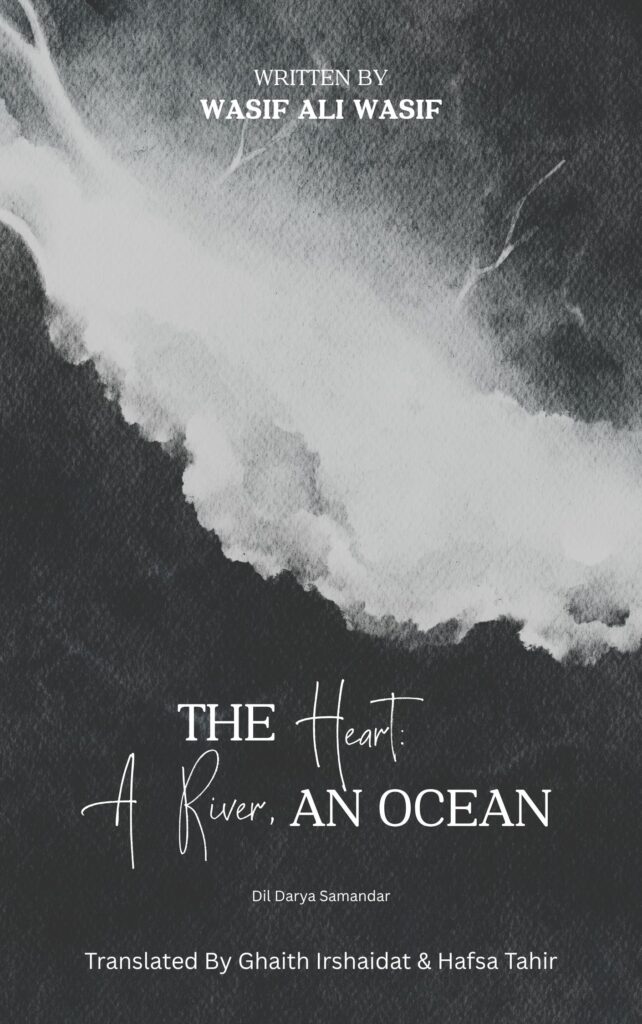
Publication Year: November 12, 2024
Translated by: Ghaith Irshaidat & Hafsa Tahir
Brief Description:
“The Heart: A River, An Ocean – Dil Darya Samandar” is a profound collection of essays by Wasif Ali Wasif that explores the spiritual and emotional currents shaping human existence in an increasingly disconnected world. In this reflective work, Wasif highlights how the heart, once a vessel for love, empathy, and higher knowledge, has become estranged from its nobler capacities amid modern challenges. Through eloquent prose, Wasif takes readers on a philosophical journey, examining themes of love, alienation, and the soul’s search for meaning in a materialistic society. Rich in Sufi metaphors and steeped in Muslim spiritual traditions, he presents love as the transformative force that can turn the heart into a flowing river, which, when shared with others, evolves into a vast, life-giving ocean. Amidst lamentations over the growing insensitivity of the modern heart, Wasif offers a hopeful vision: that through love, the soul can reconnect with its divine origins and rediscover a lost sense of fulfillment. In a time marked by cultural and spiritual alienation, “The Heart: A River, An Ocean” serves as a guide for those yearning to rediscover their inner lives and rekindle their connection to God, tradition, and themselves. This book invites readers into a rich, contemplative experience, offering a new understanding of themselves and their place in the world while emphasizing the timeless importance of love as the ultimate remedy for a soul adrift in a disconnected age.
Key Highlights or Features:
“Youth expands its circle of friends, reaching the realm of enemies, and then takes on the form of old age. The rebellions of youth become a burden of regret that constrains it, causing a person to age. In the ocean of life, an old person either floats as a corpse or sinks like a pearl. Old age is, in fact, the period of maturity of consciousness, where the body’s movements diminish, drawing the individual’s attention inward.”
This excerpt reflects on the complexities of generational communication and the introspective journey of aging, urging readers to engage deeply with their experiences and those of others.
Publication Year: November 30, 2024
Translated by: Ghaith Irshaidat & Hafsa Tahir
Brief Description:
In The Illuminated Night — Shab-e-Chirāgh, Wasif ʿAlī Wasif takes readers on a luminous journey through the realms of mysticism, self-discovery, and divine love. This collection of poetic reflections shines a light on the human soul’s yearning for truth, the interplay between light and shadow, and the profound beauty hidden in life’s smallest moments.
Each verse carries the wisdom of a Sufi master, inviting readers to ponder life’s deepest questions: the nature of existence, the essence of humility, and the mysteries of divine mercy. Wasif’s words transcend time, illuminating the path for seekers, skeptics, and lovers of poetry alike.
With its delicate blend of spiritual insight and lyrical grace, this book serves as both a companion for the contemplative heart and a guide for those searching for meaning in the night’s quiet glow.
Let The Illuminated Night — Shab-e-Chirāgh light the way to your soul’s awakening.
Key Highlights
This light is borrowed, drawn from the sun’s ray,
Hence my fear of the moonlit night’s sway.
Your mercy embraced me, held me tight,
Though I trembled, fearing the reckoning’s plight.
If one gains the eye’s true delight,
The cosmos unveils its endless sight.
First, transform yourself into a mirror pure,
And from their veil, they’ll emerge, assured.
These lines offer but a fleeting glimpse into the luminous wisdom of The Illuminated Night — Shab-e-Chirāgh. This collection brims with countless other gems waiting to be discovered.
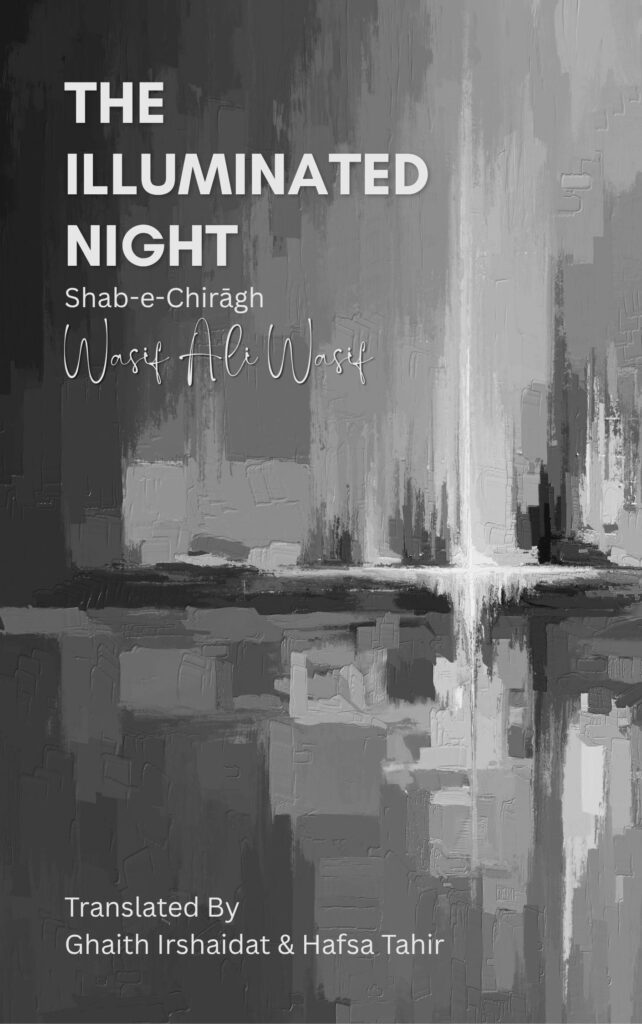
The Illuminated Night — Shab-e-Chirāgh
The Night of Secrets — Shab-e-Rāz
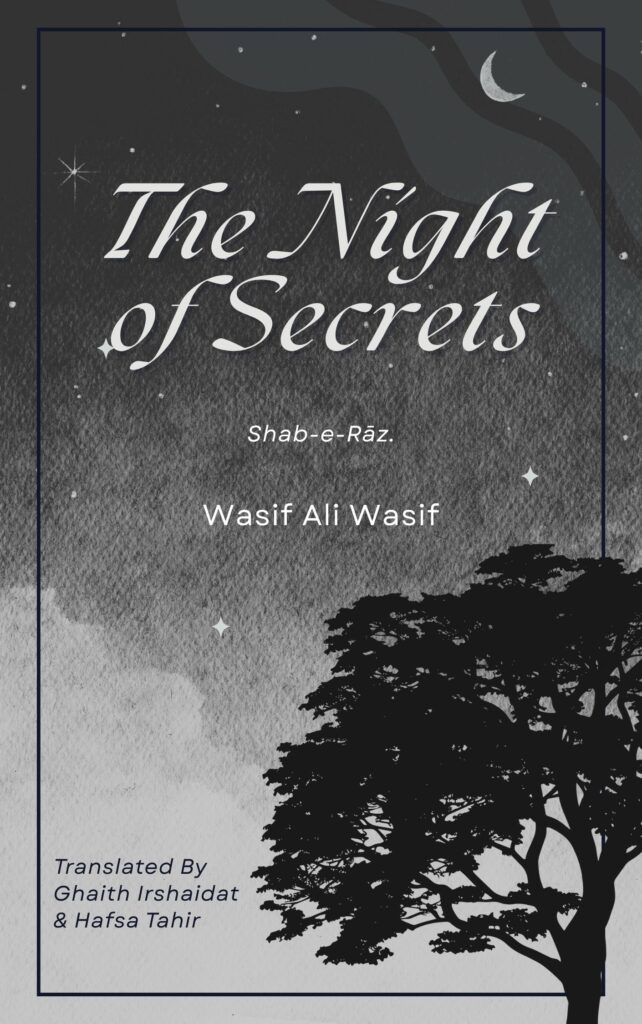
Publication Year: November 23, 2024
Translated by: Ghaith Irshaidat & Hafsa Tahir
Brief Description:
The first collection of Wāṣif Ṣāḥib’s poetry, titled Shab-e-Chirāgh, was published in 1978. This poetry, imbued with the fragrance of gnosis, gained immense popularity among the people of heart (ahl-e-dil). Literary circles warmly welcomed this profound expression of poetic insight. Later, the collection was republished with some additions.
Despite these efforts, much of the poetry remained unpublished. The poetry featured in various newspapers, weekly, and monthly publications had already been documented during Wāṣif Ṣāḥib’s lifetime. Additionally, some of his poetry exists in audio form—recorded on cassettes or presented as qawwali. Many of these compositions were recited to Wāṣif Ṣāḥib himself on several occasions.
The remaining poetry, preserved either as manuscripts or formally transcribed, was later compiled and published under the title Shab-e-Rāz. Now, we are delighted to present its English translation, The Night of Secrets — Shab-e-Rāz. This selection is offered to readers with great care, and we eagerly await their feedback.
Key Highlights or Features:
The saw of breath cuts down the shaded tree of life.
This world is not for dwelling; prepare for departure.
In Yathrib, the Beloved resides,
And with Him, the Most Merciful plays Holi eternally.
Yā Sīn, Ḥā Mīm, Muzzammil, Ṭā Hā, Nūr-ul-Qur’ān—
The radiant hues of divine verses resound.
Wāṣif, the helpless, wonders,
How can he unveil Your secrets?
What You are—only You know,
Or knows he, the Speaker of the Qur’ān.
These verses are just a glimpse into the treasures within The Night of Secrets — Shab e Rāz. This collection holds many more masterpieces.
Publication Year: December 2, 2024
Translated by: Ghaith Irshaidat & Hafsa Tahir
Brief Description:
Dhikru ʾl-Ḥabīb (ṣallā -llāhu ʿalayhī wa-ʾālihī wa-sallam) by Wasif Ali Wasif is a captivating collection of ḥamd and naʿt poetry that celebrates the majesty of Allah and the unparalleled love for the Prophet Muḥammad (ṣallā -llāhu ʿalayhī wa-ʾālihī wa-sallam).In this masterpiece, Wasif Ali Wasif weaves together profound spiritual insight and poetic brilliance to illuminate themes of divine closeness, prophetic beauty, and eternal mercy. Each poem is a journey into the depths of devotion, calling upon the reader to reflect, surrender, and rejoice in the glory of Al-Ḥabīb.The collection includes vivid imagery and heartfelt expressions of longing, highlighting the profound connection between the lover and the Beloved. These timeless verses resonate with anyone seeking solace, hope, and a deeper understanding of faith.Whether you are a lover of Sufi poetry or a seeker of spiritual enlightenment, Dhikru ʾl-Ḥabīb is a treasure trove of wisdom and beauty, perfect for moments of reflection or shared recitation. This book promises to leave a lasting impression on your heart and soul.
Key Highlights
Should I call you the radiant east or the luminous full moon?
Should I call you the Day of Judgment or its Arbiter supreme?
O Manifestation of God’s Beauty, O Leader of Humanity,
Should I call you the enchanted ideal of unparalleled perfection?
Your pure being is the Sovereign of all Prophets.
Should I call you the First, the Middle, or the Last?
The story of Prophethood culminates with you.
Should I call you the Prophet of Seal-bearing Messengers?
Within the heart of the shell was God’s Hidden Treasure.
Should I call you the Pearl of Creation’s origin?
You are matchless, unparalleled—the Beloved of Truth.
Should I call you the embodiment of Beauty’s imagination?
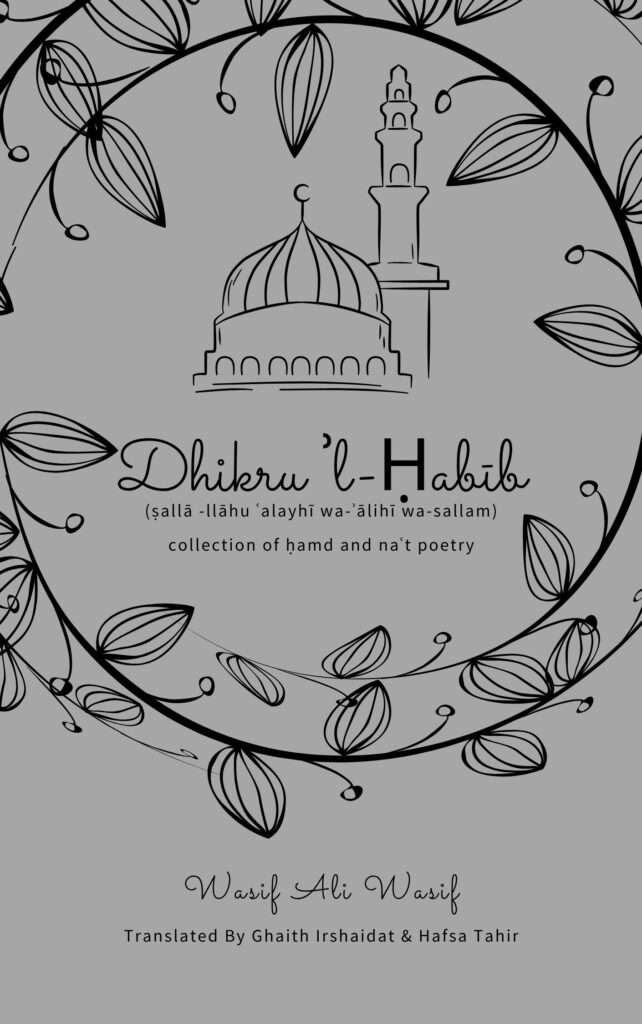
Dhikru ʾl-Ḥabīb
(ṣallā -llāhu ʿalayhī wa-ʾālihī wa-sallam)
Granaries of Abundance – Bharay Bhaṛolay
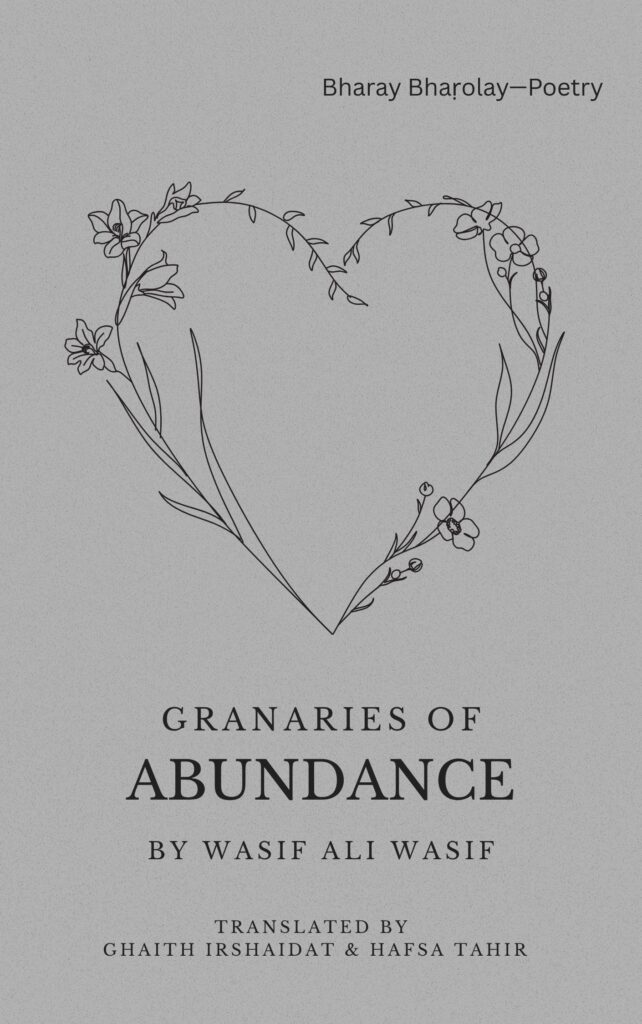
Publication Year: December 5, 2024
Translated by: Ghaith Irshaidat & Hafsa Tahir
Brief Description:
This book presents the English translation of Bharay Bhaṛolay, a collection of Punjabi poetry by the esteemed Sufi scholar and poet Wasif Ali Wasif. The original manuscript was meticulously prepared by Wasif Sahib himself, ensuring its authenticity and profound depth. The poetry embodies a deeply spiritual essence, resonating with the broader Sufi traditions of Islam while uniquely reflecting the mystical heritage of Punjab. By intertwining these rich traditions with his own spiritual experiences, Wasif Ali Wasif created a distinct and unparalleled contribution to Punjabi Sufi poetry. The verses in this collection have a transcendent quality that touches the hearts of readers, invoking a state of spiritual ecstasy and profound introspection. We are honored to present this work in English, allowing its timeless wisdom to reach a broader audience while preserving the soul of the original Punjabi verses.
Key Highlights or Features:
Do not take pride in outward beauty here,
For even the fairest face meets dust, dear.
Witness the fleeting hues of this world,
But never mistake it for your own pearl.
Avoid the harsh turns of love’s trail,
For love leaves dwellings desolate and frail.
What is mine will fall into my lap,
What is yours will come to you, perhaps.
These verses are just a glimpse into the treasures within “Granaries of Abundance” – – Bharay Bhaṛolay. This collection holds many more masterpieces.
THE POET’S SIGNATURE & PEN NAME
The Poet’s Signature: The Use of Wāṣif’s Pen Name
Wāṣif, Wāṣif (By Dr. Makhdūm Muḥammad Ḥusayn)
Poetry has long been one of the most effective mediums for expression. It is a powerful way to convey the innermost feelings of the heart to others. Qiblah Wāṣif Ṣāḥib once said, “When a restless heart composes a poem, it brings peace to millions of other restless hearts.” Even in ancient times, remarkable poetry has been found. In early Arabic poetry, poets used takhaluṣ (pen names). The takhaluṣ not only serves the purpose of identifying the poet but also preserves the integrity of both the poet’s work and the name embedded within the poetry. This ensures that the poetry is recognized with its poet and remains in the world even after them.
Dātā Ṣāḥib, Ḥaḍrat ʿAlī b. ʿUthmān al-Hujwīrī, wrote in the preface of his renowned work Kashf al-Maḥjūb that he inscribed his name on the book so that it could be known by his name and to prevent a false claimant from ascribing it to themselves. He mentioned an incident where someone borrowed his complete dīwān (poetic collection) and, upon returning home, erased Ḥaḍrat’s name and replaced it with their own, falsely attributing the work to themselves. Thus, the takhaluṣ in poetry serves this important purpose as well.
In ancient times, people were often known by the name of their region or residence. Great generals, nobles, and traders would attach their city or region’s name to their own. Poets also adopted this tradition. From the Ḥāfiẓ of Shīrāz and Shaykh Saʿdī to Walī Dakkanī, Dāgh Dehlavī, Akbar Allahābādī, and Majīd Lāhaurī, this practice continued. Some poets chose their pen names based on their connection to a particular personality, while others added their profession or trade to their name, such as ʿUmar Khayyām and Manṣūr Ḥallāj. Many poets used a part of their own name as their takhaluṣ, and some even adopted multiple pen names.
Ḥaḍrat Bū ʿAlī Qalandar, may Allah’s mercy be upon him, used “Bū ʿAlī” as well as “Sharaf” as his takhaluṣ, since his real name was Shaykh Sharaf al-Dīn. Similarly, Mirzā Asadullāh Khān Ghālib used both “Asad” and “Ghālib” as his pen names. Some poets chose the first part of their name as their pen name, such as Mīr Taqī adopting “Mīr” and Ḥakīm Mūmin Khān using “Mūmin.”
How Wāṣif ʿAlī Wāṣif Became His Name
Some time before the birth of Qiblah Wāṣif Ṣāḥib, his great-grandfather, Malik Ghawth Muḥammad, saw in a dream that a grandson as radiant as the moon would be granted to his son, Malik Muḥammad ʿĀrif. He was instructed to name this child “Muḥammad Wāṣif.” However, he did not disclose the name to the family members. On the day Wāṣif Ṣāḥib was born, the family playfully instructed the midwife to inform Malik Ṣāḥib that a girl had been born. Upon hearing the news, Malik Ghāwth Ṣāḥib immediately exclaimed, “I have seen the child’s name written on the Throne as ‘Muḥammad Wāṣif’; how could it be a girl?” And thus, his name was chosen as Muḥammad Wāṣif.
During his school and college years, he was called Malik Muḥammad Wāṣif. At the time when he was spiritually illuminated, an elder visited him and said, “How long will you hide yourself? The time has come for God’s creation to benefit from you.” This elder proclaimed, “I am a witness to how and to what extent Wāṣif Ṣāḥib has been bestowed with divine grace.” Finally, addressing Wāṣif Ṣāḥib, he said, “You are indeed the Wāṣif of ʿAlī.” From that moment on, his name became Wāṣif ʿAlī, and once the poetry began to flow, he became known as Wāṣif ʿAlī Wāṣif.
Poetry Without the Pen Name
While composing poetry, Wāṣif Ṣāḥib maintained his humility and the desire to remain hidden. In many of his Urdu and Punjabi poems, he did not include his pen name at the end. If we were to collect such poems, we would find approximately fourteen instances where his name does not appear at the end. His longest poem, Dūr kī Āwāz (“The Distant Call”), is considered a masterpiece, and it ends without a takhaluṣ:
Ānē wālē kamāl kē din haiñ
ʿAẓmat Dhū al-Jalāl kē din haiñ
Translation:
“The days of excellence are approaching,
The days of the majesty of the Almighty are near.”
Similarly, in his naʿt Baʿd az Khudā Buzurg Tuʾī (“After God, You are the Greatest”), no pen name is present. The same is true in the manqabat in praise of Mawlā ʿAlī (karamallāhu wajhahū), titled Lāfatā. The final verse of the poem in honor of Imām Ḥusayn ʿalayhi al-salām is:
Al-Salām ayyā gōhar ʿAyn ʿAlī
Dīn-i Payġhambar kē ʿunwān-i jalī
Translation:
“Peace be upon you, the pearl of the Eye of ʿAlī,
The bright title of the Prophet’s religion.”
In various ghazals, this trend continues. In Shab Chirāġh (“The Illuminated Night”), there are three ghazals (no. 26, 27, and 57) where no takhaluṣ is used. Similarly, in his Punjabi poem Bharē Bhrōlē (“Granaries of Abundance “), we see the same situation, such as on page 46 and again on page 78 in ghazal no. 24, where the final couplet reads:
Kēcẖ nūñ kar gaʾē kūcẖ pyārē
Sassī nūñ gal lāʾōn wālē
Translation:
“The dear one departed toward Kēcẖ,
Who once held Sassī in his tender embrace.”
Poems with the Pen Name “Wāṣif ʿAlī”
However, in other poems and ghazals, the takhaluṣ “Wāṣif” is present, though in certain interesting instances, “Wāṣif ʿAlī” is used instead. In Shab Chirāġh, the pen name “Wāṣif ʿAlī” appears in eight verses. In his famous poem Galīm Būzarī (“The Cloak of Būzarī”), the final couplet reads:
Faqr mil jāʾē jisē wuh hai walī
Kaun samjhāʾē tujẖē Wāṣif ʿAlī
Translation:
“Whoever receives faqr becomes a saint,
Who can make you understand, O Wāṣif ʿAlī?”
Similarly, in ghazal no. 20 from Shab Chirāġh (page 149), we find:
Wāṣif ʿAlī talāsh karē ab kahāñ tujẖē
Dūrī kō jab hai tujẖ sē taʿalluq qarīb kā
Translation:
“Where can Wāṣif ʿAlī now seek you,
When distance bears a closeness to you?”
Another couplet from his works where the full name “Wāṣif ʿAlī Wāṣif” is used:
Gadāyē ḥusn tū, man kamtarīn Wāṣif ʿAlī Wāṣif
Karam kardī kih bandah bēqarāram yā Rasūl Allāh
Translation:
“A humble beggar of beauty, the lowliest of the low am I, Wāṣif ʿAlī Wāṣif,
Extend your mercy upon me, for I am a restless servant, O Messenger of God (ṣallā -llāhu ʿalayhī wa-ʾālihī wa-sallam)!”
One of the most fascinating examples is a poem where his name appears three times:
Main miskīn purānā khādim kisī dar malī na dẖūʾī
Wāṣif yār nē naẓar jo kītī, Wāṣif, Wāṣif huʾī
Translation:
“As a humble, old servant, I found no refuge anywhere,
But when the beloved gazed upon me, all whispered my name, ‘Wāṣif, Wāṣif,’ in reverent air.”
In the poem Ganj Bakhsh Faiz-e-ʿĀlam, his pen name appears in the second-to-last couplet:
Wāṣif maskīn, chih gūyad īn maqām-i ḥayrat ast
Khājah-yi man, qiblah-yi man, guft qawl-i ḥaqq bajā
Translation:
“Wāṣif, the humble, what can he say? This is a station of bewilderment,
My Master, my Guide, said the word of Truth correctly.”
In one verse, his pen name appears as “Wāṣif Shāh”:
Ay thē Wāṣif Shāh na koʾī
Pal dī pal wasāh na koʾī
Translation:
“Here, there is no one like Wāṣif Shāh,
There’s no breath that lasts longer than a moment.”
In one ghazal, his name is present right from the opening verse, which begins:
Kyā milē Wāṣif kī mastī kā surāgh
Translation:
“How can one trace the intoxication of Wāṣif?”
In addition to poetry, he has expressed his name in various ways, such as “Wāṣif Bāṣafā” (“Wāṣif, the Pure”), “Wāṣif Bismil” (“Wāṣif, the Sacrificed”), and “Wāṣif Bādil” (“Wāṣif, with a Heart”). These pen names are used in the following verses:
Mērā nām Wāṣif Bāṣafā, mērā pīr Sayyid Murtazā
Mērā wird Aḥmad Mujtabā, main sadā bahār kī bāt hūñ
Translation:
” My name is Wāṣif—pure in essence, my guide is Sayyid Murtazā (may Allah honor his face).
My constant chant is Aḥmad Mujtaba (peace and blessings be upon him and his family), I am the voice of eternal spring, the echo of everlasting grace.”
Main Wāṣif Bismil hūñ, main rōnaq-i-maḥfil hūñ
Ik ṭūṭā huʾā dil hūñ, main shahr mēñ vīrānah
Translation:
“I am Wāṣif, the Sacrificed, I am the life of the gathering,
I am a broken heart, I am desolation within the city.”
Ṭūfān hūñ, sāḥil hūñ,
Raṣṭah hūñ kih manzil hūñ,
Main Wāṣif Bādil hūñ
Translation:
“I am the storm, I am the shore,
I am the path, or I am the destination,
I am Wāṣif, with a Heart.”
In one instance, he uses his name in such a way that it carries two meanings: it fulfills the need for a pen name, while also conveying the impression that the entire homeland becomes a reflection of the grandeur of the believer’s heart.
From this overview, one remarkable realization emerges: from the unity of his name, a wondrous world of multiplicity and manifestation is born. The time has come for this name to display its radiance in different languages, transforming as it crosses linguistic boundaries, while his ideas continue to appear in new forms and names.